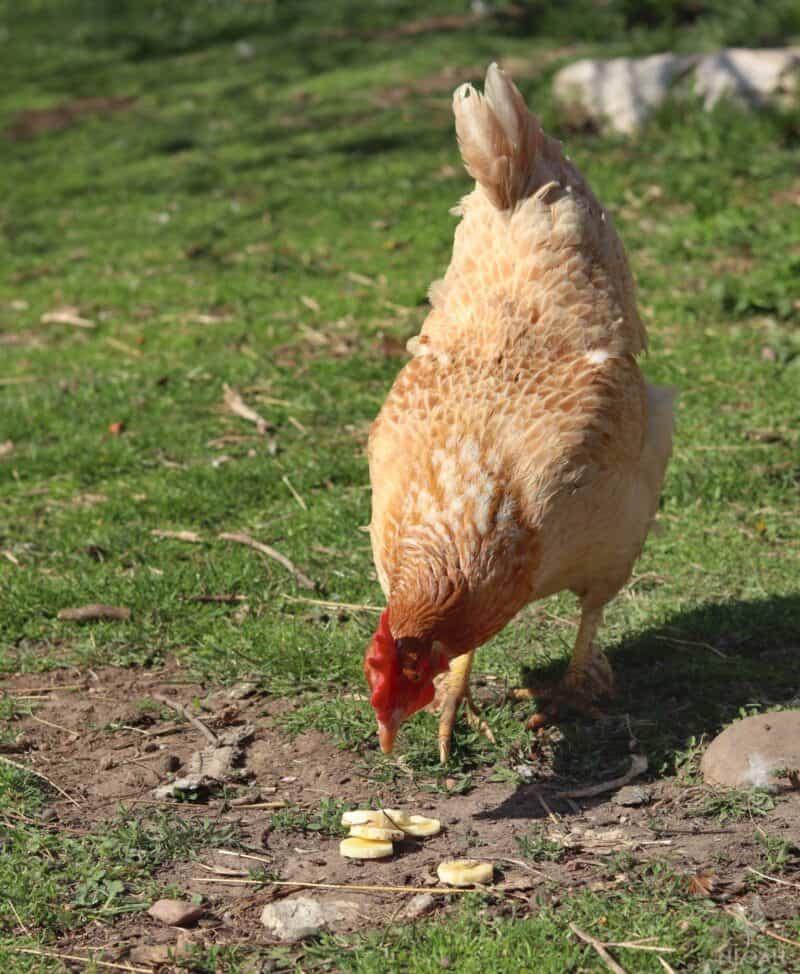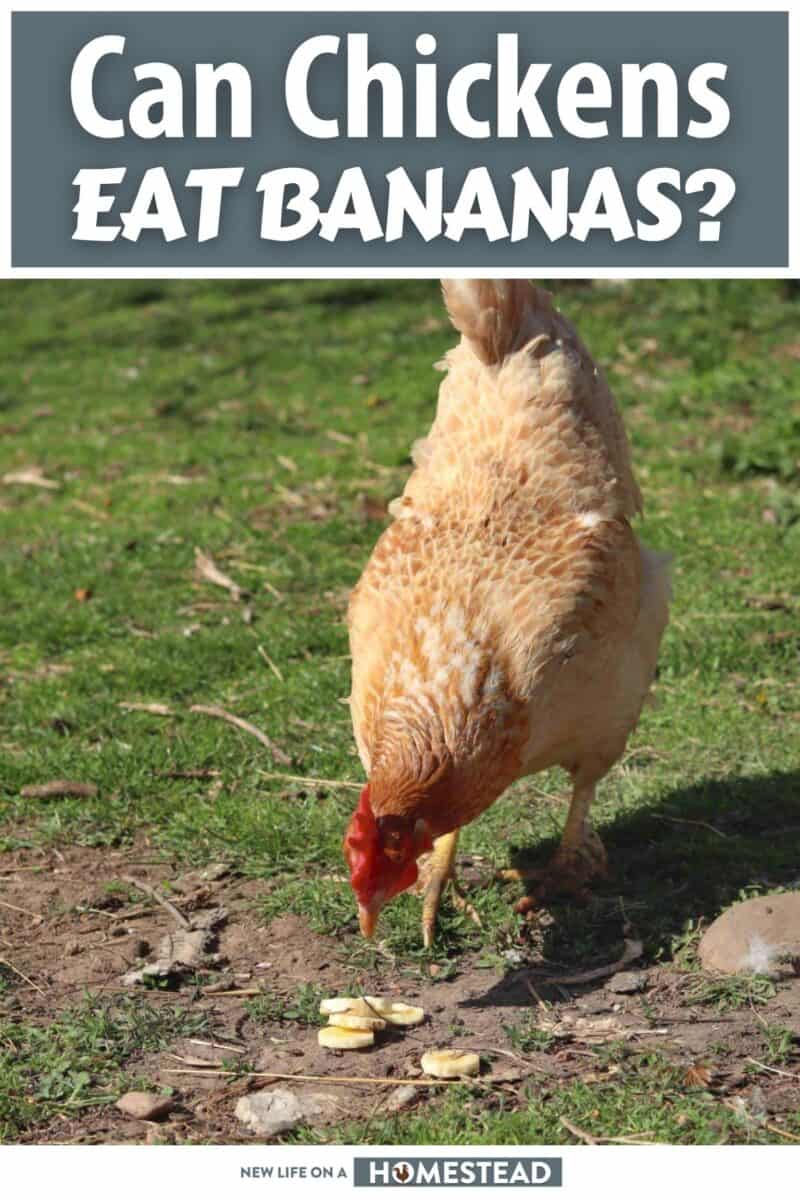In the wild, chickens will eat a variety of fruits and vegetables, among other things. In domestic life, chickens still enjoy and will benefit from a varied diet containing plenty of produce.

Most owners know that chickens can eat just about anything and that fruits and vegetables like apples, carrots, and spinach are all favorites of our feathered friends.
But questions often arise about the suitability of more exotic or tropical fare for domesticated birds. By far the most common tropical staple in the average kitchen is the banana.
Can your chickens eat bananas?
Yes, chickens can eat bananas. Bananas are an excellent source of potassium, magnesium, and B-vitamins for chickens and they provide many health benefits when given as part of a balanced diet. However, it’s important to be aware of the high sugar content of bananas, as too much can easily be harmful to chickens.
Bananas are a safe and nutritious treat for your flock, and watching them peck away at them is bound to bring a smile to your face.
Keep reading and we’ll tell you everything you need to know about giving them to your chickens.
What is the Nutritional Profile of Bananas?
Bananas are one of those fruits that are so delicious they really do feel like a guilty pleasure. But bananas are quite healthy, both for humans and for our beloved chickens.
Bananas are a great source of potassium, magnesium, and B-vitamins, all essential for the health of chickens.
Potassium is an important mineral for chickens, as it helps to maintain muscle health, electrolyte balance, and good metabolism.
It is also good for stress relief; some chickens that display behavioral issues might be suffering from nutrient deficits, of which potassium is quite common.
Potassium is found in many chicken feeds and other supplements but is also abundant in bananas. In this way, bananas can serve as potassium-rich additions to their usual diet or a potassium-packed supplement when required.
| 100g Bananas | Amount |
|---|---|
| Water | 74.91 g |
| Calories | 89 kcal |
| Protein | 1.09 g |
| Total lipid (fat) | 0.33 g |
| Carbohydrate, by difference | 22.84 g |
| – Fiber, total dietary | 2.6 g |
| – Sugars, total including NLEA | 12.23 g |
| Calcium, Ca | 5 mg |
| Iron, Fe | 0.26 mg |
| Magnesium, Mg | 27 mg |
| Phosphorus, P | 22 mg |
| Potassium, K | 358 mg |
| Sodium, Na | 1 mg |
| Zinc, Zn | 0.15 mg |
| Copper, Cu | 0.078 mg |
| Selenium, Se | 1 µg |
| Vitamin C | 8.7 mg |
| Thiamin | 0.031 mg |
| Riboflavin | 0.073 mg |
| Niacin | 0.665 mg |
| Vitamin B-6 | 0.367 mg |
| Folate, total | 20 µg |
| Choline, total | 9.8 mg |
| Vitamin A, RAE | 3 µg |
| Carotene, beta | 26 µg |
| Carotene, alpha | 25 µg |
| Lutein + zeaxanthin | 22 µg |
| Vitamin E | 0.1 mg |
| Vitamin K | 0.5 µg |
Magnesium is another mineral that is essential for chickens and is important for heart support. It also keeps energy levels up and helps prevent all kinds of common diseases.
Chickens need a good supply of magnesium in their diet to stay healthy, and it’s important to make sure they are getting enough.
Commonly given to chickens in supplements, either powder or liquid form, bananas are also a reliable source that you won’t have to struggle to get your chickens to eat!
Lastly, bananas are rich in B-vitamins, which are essential for all kinds of avian biological processes, but particularly egg production and nerve tissue health.
B-vitamins are also important for maintaining peak energy levels and will give your chickens pep in their step.
Be Cautious of Sugar and Moisture Content
While bananas offer many nutritional benefits for chickens, it’s important to be aware of the high sugar content of this fruit.
Most birds, and chickens in particular, were simply not designed to eat a sugar-rich diet.
Bananas are quite sugary, and eating too many of them or eating them too often will be harmful to chickens.
First, too much sugar can lead to weight gain and then obesity, which can, in turn, cause health problems such as heart disease and fatty liver syndrome, the latter being particularly lethal to chickens.
Second, sugar can interfere with the absorption of nutrients, making it difficult for chickens to get the vitamins and minerals they need from other parts of their diet.
Finally, sugar can increase the risk of bacterial or yeast infections, as bacteria thrive on sugary substances.
For these reasons, it is important to limit the amount of sugar that chickens consume, even from wholesome fruit no matter how much they like it, or how healthy they are otherwise.
There is simply no way to offset the sugar content in these tropical fruits and your birds will begin to suffer in time.
Also, chickens should predominantly subsist on dry or nearly dry foods. Their digestive tracts struggle to deal with a lot of moisture, so eating too many juicy fruits or other moist foods can cause problems.
This can lead to diarrhea among other troubles, so for this reason it is best to give bananas to chickens as an occasional treat.
Chickens Can Eat the Peels
The cautionary warning is done, time for more good news about bananas. It turns out that chickens can eat every, single part of the banana.
There is simply nothing in them that are overtly harmful or toxic aside from the high sugar content, as mentioned. In fact, your chickens are quite likely to try and eat it peel and all!
However, when considering any product as a treat or nutritional supplement for your birds and bananas in particular you must be aware of pesticide residues.
Many fruits are treated with copious amounts of pesticide to prevent damage and ensure they will make it to the market where they will be purchased. Tropical fruits are often heavily treated in this way.
These pesticide residues can prove to be harmful to your flock. The best way to avoid the gradual buildup of pesticide toxins is to either buy organic produce, including bananas, for your chickens or to thoroughly boil the peels to release and remove the pesticide residues.
More on preparation in the next section!
The peel is also good for your birds, and not just a source of entertainment. It is high in fiber, which can help with digestive issues and helps to maintain good gastrointestinal health.
Aside from fiber, banana peels contain a lot of cellulose. It won’t hurt your birds, so long as they aren’t getting way too much of it, but it has no nutritional impact either way.
It also contains all of the vitamins and minerals found in the flesh of the fruit, itself, just in lower concentrations. So if you’re looking for a nutritious treat for your flock, don’t throw away those peels.
That being said, the peels are fairly tough, especially for smaller birds, so you might want to prepare the banana peel to make it easier to eat. More on that in the next section.
Preparation
Like most produce, chickens can eat raw bananas just fine, though you should know starting out that they greatly prefer very ripe bananas.
They should eat yellow or green bananas, but they’ll probably save them for last. If you give them to your birds raw, they will split the peel open easily with their beaks and dig in.
Some of the chickens will probably try to eat the peel, but considering how tough and fibrous it is, they might have a hard time actually tearing pieces from it.
If you want to make sure they’re getting the full benefits of the peel, you can boil it or bake it to soften it up before chopping it into smaller pieces.
This will make it much easier for them to eat, just make sure to let it cool before serving it to them.
No matter how you want to prepare it, chickens can eat bananas safely and get good nutrition from them. Just make sure to offer them in moderation because of the high sugar content!
Can Chicks Have Bananas, Too?
Chicks, like their parents, will also love bananas and they will greatly benefit from the vitamins and minerals they contain.
However, a little special preparation will make the meal easier to eat and more enjoyable for them.
First, you should probably forget about trying to feed peels to chicks no matter how you prepare them. They are just too tough and it’s chewy, even when boiled, for your chicks to eat easily.
Second, you should chop up the flesh of the banana into tiny pieces or thoroughly mash it with a fork or potato masher to make it easier for the chicks to eat.
As always, chicks are vulnerable to choking when they literally bite off more than they can chew, or swallow, in this case!
Be Prepared for Cleanup
Soft, mushy foods like bananas should only be given to your chickens periodically as they can cause issues if they are allowed to overindulge.
Soft or moist foods can lead to issues with crops, and even a small serving of bananas can lead to your chickens getting turned into a sticky mess.
If you notice plenty of preening going on after mealtime it is because your chickens are trying to clean their feathers of a sugary mess.
Swiping their beaks at the ground or other obstacles in an effort to clean them off in the same way. Be prepared to step in and help your birds “freshen up” after they chow down on bananas, if necessary.

Tom has lived and worked on farms and homesteads from the Carolinas to Kentucky and beyond. He is passionate about helping people prepare for tough times by embracing lifestyles of self-sufficiency.
